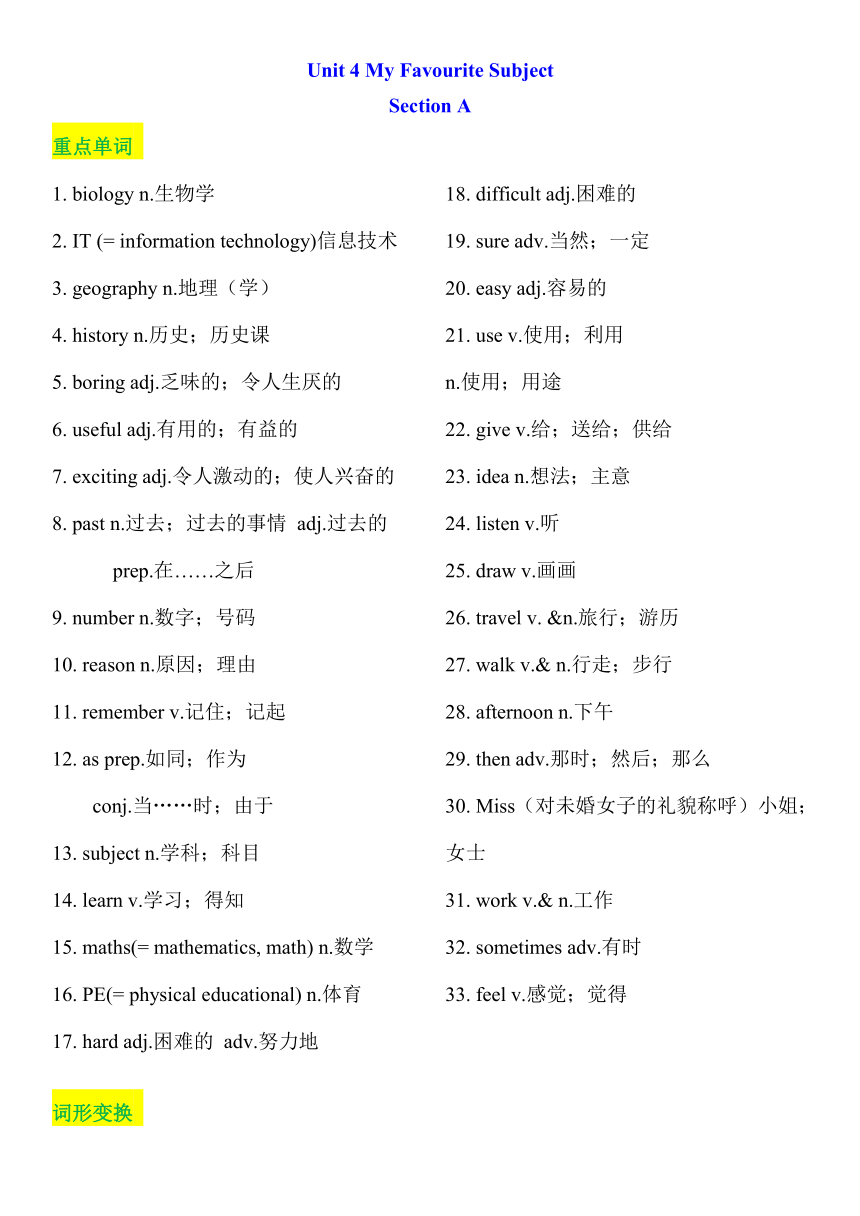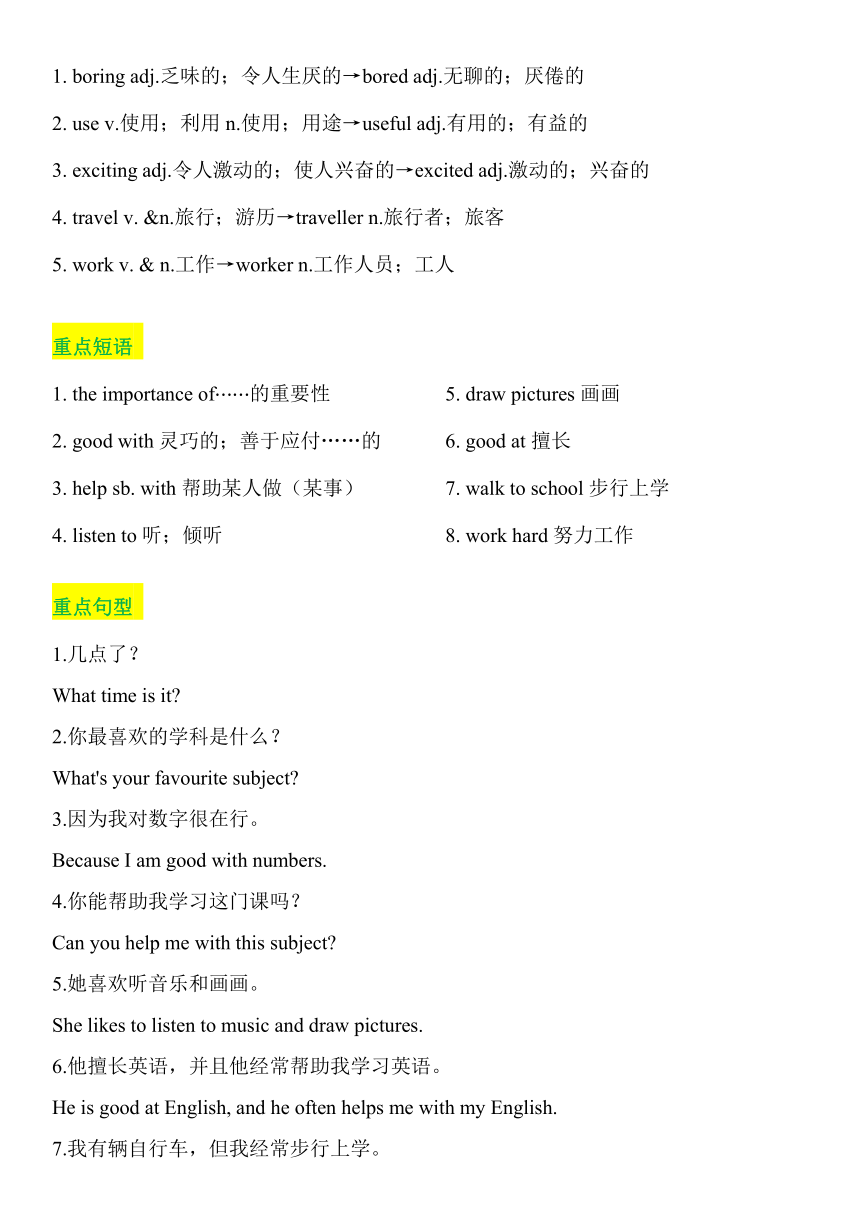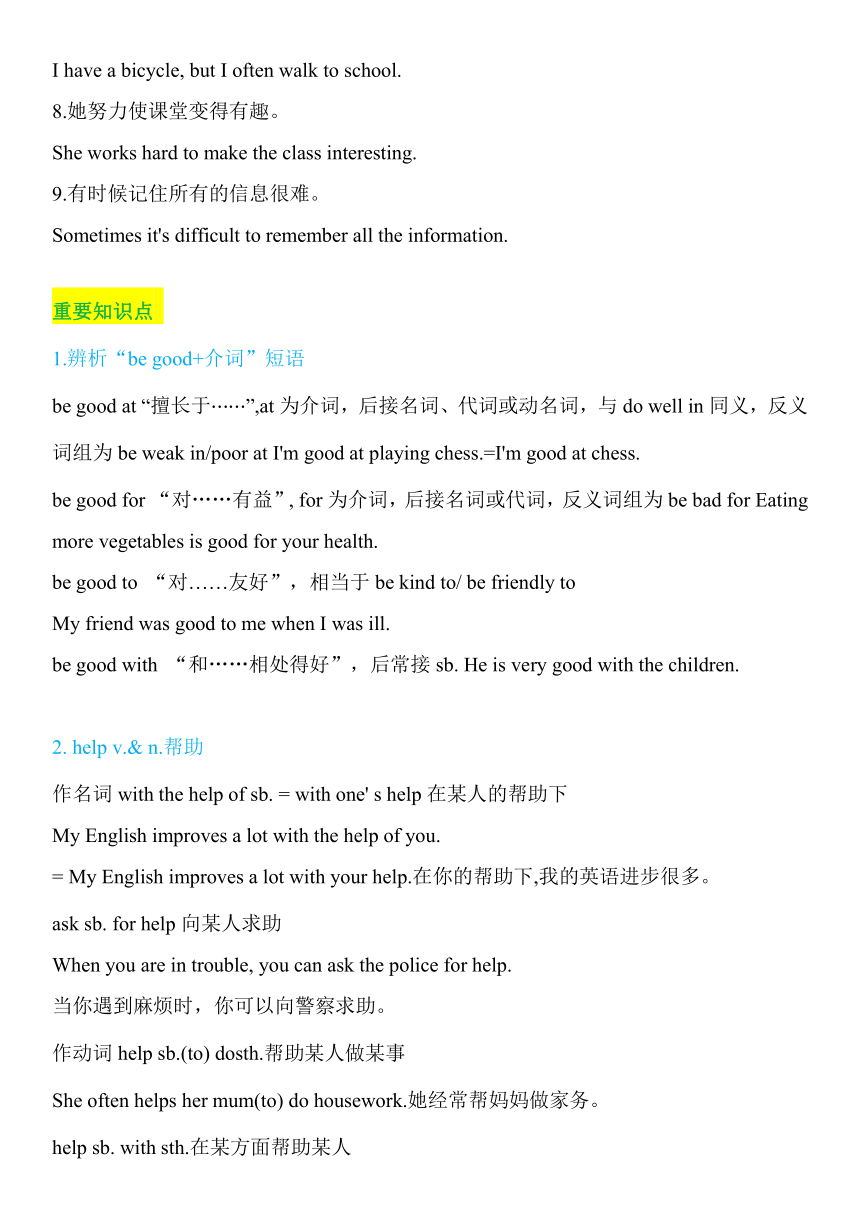Unit4 My Favorite Subject重点知识必背清单 2025-2026学年人教版(2024)七年级英语上册
文档属性
| 名称 | Unit4 My Favorite Subject重点知识必背清单 2025-2026学年人教版(2024)七年级英语上册 |  | |
| 格式 | docx | ||
| 文件大小 | 20.9KB | ||
| 资源类型 | 教案 | ||
| 版本资源 | 人教版 | ||
| 科目 | 英语 | ||
| 更新时间 | 2025-07-15 10:47:25 | ||
图片预览



文档简介
Unit 4 My Favourite Subject
Section A
重点单词
1. biology n.生物学
2. IT (= information technology)信息技术
3. geography n.地理(学)
4. history n.历史;历史课
5. boring adj.乏味的;令人生厌的
6. useful adj.有用的;有益的
7. exciting adj.令人激动的;使人兴奋的
8. past n.过去;过去的事情 adj.过去的
prep.在……之后
9. number n.数字;号码
10. reason n.原因;理由
11. remember v.记住;记起
12. as prep.如同;作为
conj.当……时;由于
13. subject n.学科;科目
14. learn v.学习;得知
15. maths(= mathematics, math) n.数学
16. PE(= physical educational) n.体育
17. hard adj.困难的 adv.努力地
18. difficult adj.困难的
19. sure adv.当然;一定
20. easy adj.容易的
21. use v.使用;利用
n.使用;用途
22. give v.给;送给;供给
23. idea n.想法;主意
24. listen v.听
25. draw v.画画
26. travel v. &n.旅行;游历
27. walk v.& n.行走;步行
28. afternoon n.下午
29. then adv.那时;然后;那么
30. Miss(对未婚女子的礼貌称呼)小姐;女士
31. work v.& n.工作
32. sometimes adv.有时
33. feel v.感觉;觉得
词形变换
1. boring adj.乏味的;令人生厌的→bored adj.无聊的;厌倦的
2. use v.使用;利用n.使用;用途→useful adj.有用的;有益的
3. exciting adj.令人激动的;使人兴奋的→excited adj.激动的;兴奋的
4. travel v. &n.旅行;游历→traveller n.旅行者;旅客
5. work v. & n.工作→worker n.工作人员;工人
重点短语
1. the importance of 的重要性
2. good with灵巧的;善于应付……的
3. help sb. with帮助某人做(某事)
4. listen to听;倾听
5. draw pictures画画
6. good at擅长
7. walk to school步行上学
8. work hard努力工作
重点句型
1.几点了?
What time is it
2.你最喜欢的学科是什么?
What's your favourite subject
3.因为我对数字很在行。
Because I am good with numbers.
4.你能帮助我学习这门课吗?
Can you help me with this subject
5.她喜欢听音乐和画画。
She likes to listen to music and draw pictures.
6.他擅长英语,并且他经常帮助我学习英语。
He is good at English, and he often helps me with my English.
7.我有辆自行车,但我经常步行上学。
I have a bicycle, but I often walk to school.
8.她努力使课堂变得有趣。
She works hard to make the class interesting.
9.有时候记住所有的信息很难。
Sometimes it's difficult to remember all the information.
重要知识点
1.辨析“be good+介词”短语
be good at “擅长于 ”,at为介词,后接名词、代词或动名词,与do well in同义,反义词组为be weak in/poor at I'm good at playing chess.=I'm good at chess.
be good for “对……有益”, for为介词,后接名词或代词,反义词组为be bad for Eating more vegetables is good for your health.
be good to “对……友好”,相当于be kind to/ be friendly to
My friend was good to me when I was ill.
be good with “和……相处得好”,后常接sb. He is very good with the children.
2. help v.& n.帮助
作名词with the help of sb. = with one' s help在某人的帮助下
My English improves a lot with the help of you.
= My English improves a lot with your help.在你的帮助下,我的英语进步很多。
ask sb. for help向某人求助
When you are in trouble, you can ask the police for help.
当你遇到麻烦时,你可以向警察求助。
作动词help sb.(to) dosth.帮助某人做某事
She often helps her mum(to) do housework.她经常帮妈妈做家务。
help sb. with sth.在某方面帮助某人
Can you help me with my maths 你能帮助我学习数学吗?
词形变化 helpful adj. 有用的;有帮助的
The book is helpful to parents.这本书对父母很有用。
helpless adj. 无助的 It made him quite helpless. 这 使 他 很无助。
3. It is+ adj.(+ for/ of sb.)+ to do sth.句型
It's+ adj. + todo sth. it是形式主语, to do sth.为真正的主语。
It's+ adj.+ forsb.+ to do sth. 意为“做某事对某人来说 ”。
这类形容词通常是描述事物的,如:difficult, easy, hard, important, dangerous等。
It's + adj. + ofsb.+ to do sth. 意为“某人做某事真是太……了”。
这类形容词是描述行为者的性格、品质的,如:kind, good, nice, polite等。
4. remember v.记住;记起
remember 是及物动词,常用结构有:remember to do sth.记得做某事(还未做),remember doing sth.记得做了某事(已做)。
如: Please remember to turn off the light when you leave the room.
离开房间时,请记得关灯。
I remember putting my book in my schoolbag, but it's not in it.
我记得把我的书放进我的书包了,但它不在里面。
Section B
重点单词
1. AM(=a. m.)上午
2. PM(=p. m.)下午;午后
3. French n.法语
adj.法国的;法国人的;法语的
4. excellent adj.优秀的;极好的
5. instrument n.乐器;器械;工具
6. singer n.歌手
7. future n.将来;未来
8. term n.学期
9. problem n.难题;困难
10. magic n.魔法;魔力;魔术
adj.有魔力的;有神奇力量的
11. life n.生活;生命
12. scientist n.科学家
13. Canada加拿大
14. busy adj.忙碌的;无暇的
15. study v.& n.学习;研究
16. song n.歌曲
17. out adv.& prep.(从……里)出来;出去
词形变换
1. sing v.唱(歌);演唱→singer n.歌手
2. life n.生活;生命→(复数)lives
3. science n.科学→scientist n.科学家
4. study v.学习→studies(第三人称单数形式)
重点短语
1. learn from向……学习;从……学到
2. all kinds of各种各样的
3. in the future将来;未来
4. work out计算出;解决
5. in class课堂上
6. feel like感觉像是;给……的感觉
7. in one' s life在生活中
重点句型
1.他让我们演奏各种有趣的乐器。
He lets us play all kinds of interesting instruments.
2.我们在课堂上学习如何解数学题。
We learn how to work out maths problems in class.
3.感觉就像变魔术一样,真的很有趣。
It feels like magic and is really fun.
4.将来我想成为科学家。
I want to be a scientist in the future.
5.迈克对音乐有什么看法?
How does Mike feel about music
重要知识点
1. learn v.学习;得知
learn构成的常用短语:
learn to do sth.学习/学会做某事
learn(sth.) from向……学习(……);从……学到(……)
learn(sth.) by oneself自学(……)
learn about了解 ;获悉
2. work out计算出;解决
work out是“动词+副词”形式的短语,后可接宾语。如果宾语是名词,既可放在out前,也可放在out后;但如果宾语是人称代词,则只能放在out前。
如: The maths problem is so difficult that I can't work it out.这道数学题太难了,我解不出来。
Let's work out the cost first before we travel.我们在旅行前先算一下费用吧。
3. feel like感觉像是;给……的感觉
feel like后接名词或从句。
如: It feels like rain soon.感觉像是马上要下雨了。
She feels like she is in a very nice dream.她感觉像在美梦里一样。
【拓展】
(1)"feel like+名词/代词“表示“想要……”。
如:I feel like a rest after the long journey.长途旅行后我想休息一下。
(2)"feel like doing sth."意为“想做某事”
=want to do sth.
=would like to do sth.
如:I feel like eating out tonight.
=I want to eat out tonight.
=I would like to eat out tonight.
我今晚想出去吃饭。
Section A
重点单词
1. biology n.生物学
2. IT (= information technology)信息技术
3. geography n.地理(学)
4. history n.历史;历史课
5. boring adj.乏味的;令人生厌的
6. useful adj.有用的;有益的
7. exciting adj.令人激动的;使人兴奋的
8. past n.过去;过去的事情 adj.过去的
prep.在……之后
9. number n.数字;号码
10. reason n.原因;理由
11. remember v.记住;记起
12. as prep.如同;作为
conj.当……时;由于
13. subject n.学科;科目
14. learn v.学习;得知
15. maths(= mathematics, math) n.数学
16. PE(= physical educational) n.体育
17. hard adj.困难的 adv.努力地
18. difficult adj.困难的
19. sure adv.当然;一定
20. easy adj.容易的
21. use v.使用;利用
n.使用;用途
22. give v.给;送给;供给
23. idea n.想法;主意
24. listen v.听
25. draw v.画画
26. travel v. &n.旅行;游历
27. walk v.& n.行走;步行
28. afternoon n.下午
29. then adv.那时;然后;那么
30. Miss(对未婚女子的礼貌称呼)小姐;女士
31. work v.& n.工作
32. sometimes adv.有时
33. feel v.感觉;觉得
词形变换
1. boring adj.乏味的;令人生厌的→bored adj.无聊的;厌倦的
2. use v.使用;利用n.使用;用途→useful adj.有用的;有益的
3. exciting adj.令人激动的;使人兴奋的→excited adj.激动的;兴奋的
4. travel v. &n.旅行;游历→traveller n.旅行者;旅客
5. work v. & n.工作→worker n.工作人员;工人
重点短语
1. the importance of 的重要性
2. good with灵巧的;善于应付……的
3. help sb. with帮助某人做(某事)
4. listen to听;倾听
5. draw pictures画画
6. good at擅长
7. walk to school步行上学
8. work hard努力工作
重点句型
1.几点了?
What time is it
2.你最喜欢的学科是什么?
What's your favourite subject
3.因为我对数字很在行。
Because I am good with numbers.
4.你能帮助我学习这门课吗?
Can you help me with this subject
5.她喜欢听音乐和画画。
She likes to listen to music and draw pictures.
6.他擅长英语,并且他经常帮助我学习英语。
He is good at English, and he often helps me with my English.
7.我有辆自行车,但我经常步行上学。
I have a bicycle, but I often walk to school.
8.她努力使课堂变得有趣。
She works hard to make the class interesting.
9.有时候记住所有的信息很难。
Sometimes it's difficult to remember all the information.
重要知识点
1.辨析“be good+介词”短语
be good at “擅长于 ”,at为介词,后接名词、代词或动名词,与do well in同义,反义词组为be weak in/poor at I'm good at playing chess.=I'm good at chess.
be good for “对……有益”, for为介词,后接名词或代词,反义词组为be bad for Eating more vegetables is good for your health.
be good to “对……友好”,相当于be kind to/ be friendly to
My friend was good to me when I was ill.
be good with “和……相处得好”,后常接sb. He is very good with the children.
2. help v.& n.帮助
作名词with the help of sb. = with one' s help在某人的帮助下
My English improves a lot with the help of you.
= My English improves a lot with your help.在你的帮助下,我的英语进步很多。
ask sb. for help向某人求助
When you are in trouble, you can ask the police for help.
当你遇到麻烦时,你可以向警察求助。
作动词help sb.(to) dosth.帮助某人做某事
She often helps her mum(to) do housework.她经常帮妈妈做家务。
help sb. with sth.在某方面帮助某人
Can you help me with my maths 你能帮助我学习数学吗?
词形变化 helpful adj. 有用的;有帮助的
The book is helpful to parents.这本书对父母很有用。
helpless adj. 无助的 It made him quite helpless. 这 使 他 很无助。
3. It is+ adj.(+ for/ of sb.)+ to do sth.句型
It's+ adj. + todo sth. it是形式主语, to do sth.为真正的主语。
It's+ adj.+ forsb.+ to do sth. 意为“做某事对某人来说 ”。
这类形容词通常是描述事物的,如:difficult, easy, hard, important, dangerous等。
It's + adj. + ofsb.+ to do sth. 意为“某人做某事真是太……了”。
这类形容词是描述行为者的性格、品质的,如:kind, good, nice, polite等。
4. remember v.记住;记起
remember 是及物动词,常用结构有:remember to do sth.记得做某事(还未做),remember doing sth.记得做了某事(已做)。
如: Please remember to turn off the light when you leave the room.
离开房间时,请记得关灯。
I remember putting my book in my schoolbag, but it's not in it.
我记得把我的书放进我的书包了,但它不在里面。
Section B
重点单词
1. AM(=a. m.)上午
2. PM(=p. m.)下午;午后
3. French n.法语
adj.法国的;法国人的;法语的
4. excellent adj.优秀的;极好的
5. instrument n.乐器;器械;工具
6. singer n.歌手
7. future n.将来;未来
8. term n.学期
9. problem n.难题;困难
10. magic n.魔法;魔力;魔术
adj.有魔力的;有神奇力量的
11. life n.生活;生命
12. scientist n.科学家
13. Canada加拿大
14. busy adj.忙碌的;无暇的
15. study v.& n.学习;研究
16. song n.歌曲
17. out adv.& prep.(从……里)出来;出去
词形变换
1. sing v.唱(歌);演唱→singer n.歌手
2. life n.生活;生命→(复数)lives
3. science n.科学→scientist n.科学家
4. study v.学习→studies(第三人称单数形式)
重点短语
1. learn from向……学习;从……学到
2. all kinds of各种各样的
3. in the future将来;未来
4. work out计算出;解决
5. in class课堂上
6. feel like感觉像是;给……的感觉
7. in one' s life在生活中
重点句型
1.他让我们演奏各种有趣的乐器。
He lets us play all kinds of interesting instruments.
2.我们在课堂上学习如何解数学题。
We learn how to work out maths problems in class.
3.感觉就像变魔术一样,真的很有趣。
It feels like magic and is really fun.
4.将来我想成为科学家。
I want to be a scientist in the future.
5.迈克对音乐有什么看法?
How does Mike feel about music
重要知识点
1. learn v.学习;得知
learn构成的常用短语:
learn to do sth.学习/学会做某事
learn(sth.) from向……学习(……);从……学到(……)
learn(sth.) by oneself自学(……)
learn about了解 ;获悉
2. work out计算出;解决
work out是“动词+副词”形式的短语,后可接宾语。如果宾语是名词,既可放在out前,也可放在out后;但如果宾语是人称代词,则只能放在out前。
如: The maths problem is so difficult that I can't work it out.这道数学题太难了,我解不出来。
Let's work out the cost first before we travel.我们在旅行前先算一下费用吧。
3. feel like感觉像是;给……的感觉
feel like后接名词或从句。
如: It feels like rain soon.感觉像是马上要下雨了。
She feels like she is in a very nice dream.她感觉像在美梦里一样。
【拓展】
(1)"feel like+名词/代词“表示“想要……”。
如:I feel like a rest after the long journey.长途旅行后我想休息一下。
(2)"feel like doing sth."意为“想做某事”
=want to do sth.
=would like to do sth.
如:I feel like eating out tonight.
=I want to eat out tonight.
=I would like to eat out tonight.
我今晚想出去吃饭。
同课章节目录
